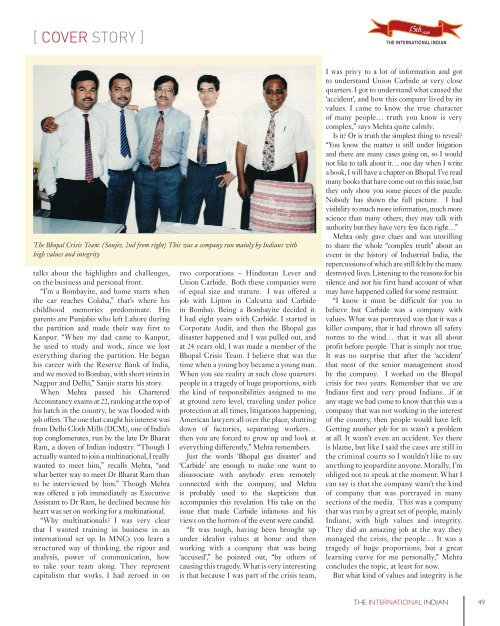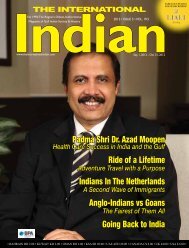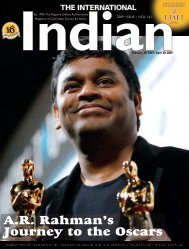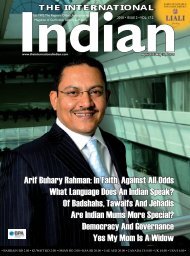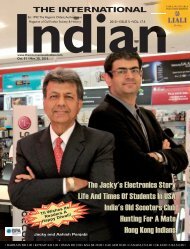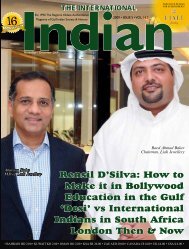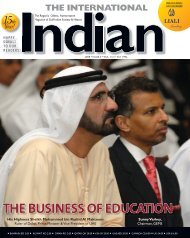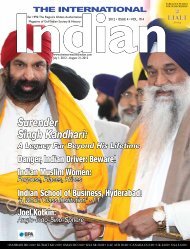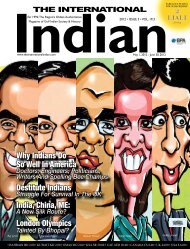THE INTERNATIONAL - International Indian
THE INTERNATIONAL - International Indian
THE INTERNATIONAL - International Indian
You also want an ePaper? Increase the reach of your titles
YUMPU automatically turns print PDFs into web optimized ePapers that Google loves.
[ COVER STORY ]<br />
The Bhopal Crisis Team: (Sanjiv, 2nd from right) This was a company run mainly by <strong>Indian</strong>s with<br />
high values and integrity<br />
talks about the highlights and challenges,<br />
on the business and personal front.<br />
“I’m a Bombayite, and home starts when<br />
the car reaches Colaba,” that’s where his<br />
childhood memories predominate. His<br />
parents are Punjabis who left Lahore during<br />
the partition and made their way first to<br />
Kanpur. “When my dad came to Kanpur,<br />
he used to study and work, since we lost<br />
everything during the partition. He began<br />
his career with the Reserve Bank of India,<br />
and we moved to Bombay, with short stints in<br />
Nagpur and Delhi,” Sanjiv starts his story.<br />
When Mehta passed his Chartered<br />
Accountancy exams at 22, ranking at the top of<br />
his batch in the country, he was flooded with<br />
job offers. The one that caught his interest was<br />
from Delhi Cloth Mills (DCM), one of India’s<br />
top conglomerates, run by the late Dr Bharat<br />
Ram, a doyen of <strong>Indian</strong> industry. “Though I<br />
actually wanted to join a multinational, I really<br />
wanted to meet him,” recalls Mehta, “and<br />
what better way to meet Dr Bharat Ram than<br />
to be interviewed by him.” Though Mehta<br />
was offered a job immediately as Executive<br />
Assistant to Dr Ram, he declined because his<br />
heart was set on working for a multinational.<br />
“Why multinationals? I was very clear<br />
that I wanted training in business in an<br />
international set up. In MNCs you learn a<br />
structured way of thinking, the rigour and<br />
analysis, power of communication, how<br />
to take your team along. They represent<br />
capitalism that works. I had zeroed in on<br />
two corporations – Hindustan Lever and<br />
Union Carbide. Both these companies were<br />
of equal size and stature. I was offered a<br />
job with Lipton in Calcutta and Carbide<br />
in Bombay. Being a Bombayite decided it.<br />
I had eight years with Carbide. I started in<br />
Corporate Audit, and then the Bhopal gas<br />
disaster happened and I was pulled out, and<br />
at 24 years old, I was made a member of the<br />
Bhopal Crisis Team. I believe that was the<br />
time when a young boy became a young man.<br />
When you see reality at such close quarters:<br />
people in a tragedy of huge proportions, with<br />
the kind of responsibilities assigned to me<br />
at ground zero level, traveling under police<br />
protection at all times, litigations happening,<br />
American lawyers all over the place, shutting<br />
down of factories, separating workers…<br />
then you are forced to grow up and look at<br />
everything differently,” Mehta remembers.<br />
Just the words ‘Bhopal gas disaster’ and<br />
‘Carbide’ are enough to make one want to<br />
disassociate with anybody even remotely<br />
connected with the company, and Mehta<br />
is probably used to the skepticism that<br />
accompanies this revelation. His take on the<br />
issue that made Carbide infamous and his<br />
views on the horrors of the event were candid.<br />
“It was tough, having been brought up<br />
under idealist values at home and then<br />
working with a company that was being<br />
‘accused’,” he pointed out, “by others of<br />
causing this tragedy. What is very interesting<br />
is that because I was part of the crisis team,<br />
I was privy to a lot of information and got<br />
to understand Union Carbide at very close<br />
quarters. I got to understand what caused the<br />
‘accident’, and how this company lived by its<br />
values. I came to know the true character<br />
of many people… truth you know is very<br />
complex,” says Mehta quite calmly.<br />
Is it? Or is truth the simplest thing to reveal?<br />
“You know the matter is still under litigation<br />
and there are many cases going on, so I would<br />
not like to talk about it… one day when I write<br />
a book, I will have a chapter on Bhopal. I’ve read<br />
many books that have come out on this issue, but<br />
they only show you some pieces of the puzzle.<br />
Nobody has shown the full picture. I had<br />
visibility to much more information, much more<br />
science than many others; they may talk with<br />
authority but they have very few facts right…”<br />
Mehta only gave clues and was unwilling<br />
to share the whole “complex truth” about an<br />
event in the history of Industrial India, the<br />
repercussions of which are still felt by the many<br />
destroyed lives. Listening to the reasons for his<br />
silence and not his first hand account of what<br />
may have happened called for some restraint.<br />
“I know it must be difficult for you to<br />
believe but Carbide was a company with<br />
values. What was portrayed was that it was a<br />
killer company, that it had thrown all safety<br />
norms to the wind… that it was all about<br />
profit before people. That is simply not true.<br />
It was no surprise that after the ‘accident’<br />
that most of the senior management stood<br />
by the company. I worked on the Bhopal<br />
crisis for two years. Remember that we are<br />
<strong>Indian</strong>s first and very proud <strong>Indian</strong>s…if at<br />
any stage we had come to know that this was a<br />
company that was not working in the interest<br />
of the country, then people would have left.<br />
Getting another job for us wasn’t a problem<br />
at all. It wasn’t even an accident. Yes there<br />
is blame, but like I said the cases are still in<br />
the criminal courts so I wouldn’t like to say<br />
anything to jeopardize anyone. Morally, I’m<br />
obliged not to speak at the moment. What I<br />
can say is that the company wasn’t the kind<br />
of company that was portrayed in many<br />
sections of the media. This was a company<br />
that was run by a great set of people, mainly<br />
<strong>Indian</strong>s, with high values and integrity.<br />
They did an amazing job at the way they<br />
managed the crisis, the people… It was a<br />
tragedy of huge proportions, but a great<br />
learning curve for me personally,” Mehta<br />
concludes the topic, at least for now.<br />
But what kind of values and integrity is he<br />
<strong>THE</strong> <strong>INTERNATIONAL</strong> INDIAN 49


